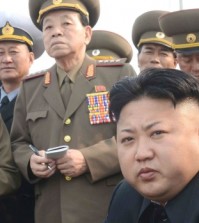- California Assembly OKs highest minimum wage in nation
- S. Korea unveils first graphic cigarette warnings
- US joins with South Korea, Japan in bid to deter North Korea
- LPGA golfer Chun In-gee finally back in action
- S. Korea won’t be top seed in final World Cup qualification round
- US men’s soccer misses 2nd straight Olympics
- US back on track in qualifying with 4-0 win over Guatemala
- High-intensity workout injuries spawn cottage industry
- CDC expands range of Zika mosquitoes into parts of Northeast
- Who knew? ‘The Walking Dead’ is helping families connect
Hallyu sparks cultural rivalry for Asia’s big 3

Psy; as Korea is tryingto extend “hallyu,” or the Korean wave, around the world, Japan and China have responded with their own policy strategies to promote their own cultural products. The Japanese government is pushing ahead with “Cool Japan,” while China is promoting the Confucius Institute program. (Korea Times file)
By Chung Ah-young
Policymakers have been desperate about extending “hallyu,” or the Korean wave, that describes the international boom in Korean pop culture exports witnessed over the past decade.
However, the government’s aggressive involvement has now presented the country with new challenges. Japan and China have responded with their own policy strategies to promote their own cultural products.
And even Korean officials admit that government involvement in recent years has fueled weariness about Korean culture overseas where consumers have been put off by the smack of nationalism.
Yoo Jin-ryong, minister of culture, sports and tourism, recently said the administration is considering reducing its presence in the entertainment sector ― movies, television and music ― and will concentrate on promoting the country’s traditional culture and food.
Cool Japan
The Japanese government is pushing ahead with “Cool Japan,” a marketing-oriented concept to establish the country as a brand name within global culture. Apparently targeting hallyu, the concept covers not only games, anime, manga, J-pop but also automobiles, electrical goods and cuisine, fashion, architecture and even sport.
Last year, the Japanese Ministry of Economy, Trade and Industry approved a $500 million “Japan Brand Fund”to invest in the growth of smaller creative industries promoting its cultural products across Southeast Asia, Europe and America.
Tokyo has viewed the success of hallyu as a national brand overseas marketing strategy supported by the government in cooperation with conglomerates. Likewise, Japan has also adopted a similar approach by earmarking a lavish budget on the cultural scene particularly targeting overseas markets despite its sluggish economic situation.
Japan’s cultural influences in art, culture and aesthetics can be traced back to the 19th century and its government’s efforts could repeat past glories.
The rise of anti-hallyu sentiment has already affected the Korean popular content there. SM Entertainment saw a 70 percent drop in sales during the first quarter of 2013 in Japan ― not only because of the weakening yen, but also the political situation between the two countries, causing a backlash from some right-wingers. A slew of Japanese television stations stopped airing Korean dramas in mid-2012 and DVD sales have dramatically dropped recently.
Last year, Japan held various events to promote its cultural products such as food and fashion in India, Italy, China and Singapore.
Confucian Institutes
The New Yorker’s Evan Osnos wrote an article “Why China Lacks Gangnam Style” last year. “In China, the Gangnam phenomenon carries a special pique. It has left people asking, Why couldn’t we come up with that? China, after all, dwarfs Korea in political clout, money, and market power, and it cranks out more singers and dancers in a single city than Korea does nationwide. Chinese political leaders are constantly talking about the need for soft power ― they have dotted the globe with Confucius Institutes to rival the Alliance Francaise, and they have expanded radio and television stations in smaller countries that might be tired of American-dominated news. Last year, the Communist Party even declared culture a national priority and vowed to produce its own share of global cultural brands,” the article said.
Coveting Korea’s latest cultural influence on the international stage, the Chinese government has been putting more emphasis on soft power in recent years.
The Confucius Institute program is an exercise in soft power, expanding China’s economic, cultural and diplomatic reach through the promotion of Chinese language and culture.
Equivalent to Korea’s King Sejong Institutes, the number of Chinese institutes has been dramatically growing in recent years. In March, China’s Confucius Institute Headquarters said that it will reach 500 global cities by 2020. Currently, there are more than 400 Confucius Institutes in over 100 countries and regions and the number will rose to 500 with 1.5 million registered students. Some 10,000 professional teachers and volunteers are sent to overseas institutes and classrooms.
Dreaming of becoming France’s Alliance Francaise and Germany’s Goethe-Institute, the Chinese institute program was launched in 2004. The Confucius Institutes and Confucius Classrooms serve as non-profit public institutions to promote Chinese language and culture in foreign countries.
The use of Confucius, the ancient Chinese philosopher, has been recently found in other major cultural events ― China tried to revive his legacy in the opening ceremony of the 2008 Beijing Olympic Games, and set up a controversial statute of Confucius in 2011 on Tiananmen Square in Beijing. The philosopher was vilified during the turmoil of the Cultural Revolution in the 1960s and ‘70s. The 2010 Chinese biographical film of “Confucius” hyped his legacy.
Hallyu at a crossroads
Some say that the Korean wave doesn’t feel as imperialistic to other Asians. Sarah K. Yun, a researcher at the Korea Economic Institute said that Korea has a niche in the soft power market.
“Chinese soft power has limitations. Much of the Chinese soft power strategy is focused on softening its image and alleviating international concerns over the China threat, which ultimately hampers its efforts towards a comprehensive soft power strategy. Moreover, China lacks the strong NGO community that can support a nation’s soft power,” Yun said in a recent paper.
Unlike China and some other countries, Korea has the ability to rally the government, NGOs and citizens to be active promoters of soft power. Given that Korea is surrounded by powerful countries, its comparative advantage lies in niche diplomacy that fulfills needs in often overlooked areas, according to Yun’s paper.
But more recently, in Japan and China, there has been the anti-hallyu sentiment from a loud minority, arguing that the agencies are promoting their groups more assiduously in the West. China recently passed a law limiting the amount of foreign programming on its television networks. “Hallyu, far from seeming like a benign export from a nonthreatening country, is now commonly described as an invasion as though it were a sort of mental Asian carp that is clogging up the minds of the young,” according to the New Yorker’s John Seabrook.
Also, a short-sighted profit-seeking appetite ― for example, slapping high price tags on Korean cultural products ― generates anti-hallyu sentiment in some countries and fatigues audiences with the abundant mimicry of K-pop singers around.
“I admit to the criticism that the government had been too aggressive in past years. It was funny and inappropriate that policymakers were so passionate about pumping up K-pop and other pop cultural products instead of letting the market do it,” Culture Minister Yoo said.
















